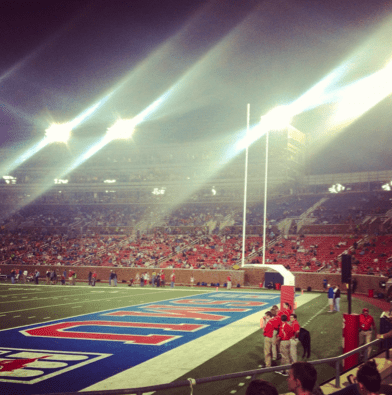
SMU fails to fill up Ford Stadium yet again as the team plays the University of Houston Cougars on Thursday, Oct. 18, 2012. (Omar Majzoub)
Before every football game at SMU, the school band walks down the Boulevard and plays the fight song. This well-know tradition is meant to be a message for everyone on campus to start heading toward the stadium for the game. However, the students, faculty, and fans have started using the song as the signal to head towards the nearest place to hangout around campus. Rather than stand outside in the heat and watch the Mustangs, most people have decided they would rather be inside watching TV and drinking a cold one.
This lack of desire to go to games is not just around the football team. SMU athletics struggles with attendance for just about every sport. The athletic department has attempted everything to try and raise fan support, but nothing seems to work. They have offered incentives, hosted events and even given out free tickets to students. Now, the school is starting to consider allowing the sale of alcohol at games on campus to help increase attendance.
“The Boulevard seems to have become a very strong tradition, but I don’t know if it’s enough to fill the stadium,” said Rick Hart, the school’s athletic director. “I think a city this size is an asset if you have a wining program and develop some traditions that people want to be a part of.”
Hart took over as athletic director on July 16 after spending six years at the University of Tennessee-Chattanooga. He is faced with the challenge of attracting and entertaining a very broad audience of students, local community members, family, alumni and more. He believes there is one solution that will draw in every type of person.
“Students and people in Dallas want to be associated with a winner,” explained Hart. “I think winning will positively impact attendance more than any other one thing we can do.”
Hart is not the only one who believes building a great program and having a good campus environment will solve the attendance problem. Most of the students around campus also said the product on the field was what meant the most to them.
“Very few colleges and pro franchises that lose consistently have brand loyalty,” said Matt Cohen, a junior marketing major at SMU. “The marketing the school does won’t matter unless you have something to back up the efforts on the playing field.”
Cohen says his friends have remained loyal to their favorite teams back home because they have been more successful than the SMU program. This desire to watch games going on around the country results in students trying to find a bar or restaurant to watch sports, rather than focus on the teams playing on campus.
One thing SMU has started to consider internally is the possible sale of alcohol at sporting events on campus. Recently, schools around the country have started to adopt this idea more and more. Hart says its something the department has discussed, but it’s more of a philosophical question for the university administration.
“It’s our job to present the information and the data to make a case for consideration,” he explained. “Then allow the university leadership to decide if that’s something that they feel aligns with SMU’s mission and image.”
The culture change is something university administration is considering. They believe strengthening the sports program is a key part of the school’s strategic plan for constant growth and improvement. However, they have to discuss the risks and benefits much more in-depth before making a final decision.
“Athletics is co-curricular and an important part of the student experience at SMU,” said Brad Cheves, vice president for developmental and external affairs. “University leadership recognizes its importance and is invested in the process of raising our athletic profile.”
The risks associated with selling alcohol on a college campus are endless. The school has an obligation to create a safe and responsible environment on campus. With over half of the student body under age, SMU would risk starting a culture of alcohol use and abuse. It would require a major increase in security at games and the concession stands would have to be very in-control and aware.
Over 20 colleges around the nation allow the sale of alcohol at their games and almost all of them had a major increase in attendance and revenue. According to the CBS article titled “Good Question: How Many Colleges Sell Beer at Sports Stadiums?” by Jason DeRusha, the University of Minnesota made almost $1.5 million more during their football season because they decided to start selling alcohol. Hart thinks this could help a little at SMU, but it’s not the ultimate solution.
“I have been to venues that do serve, I don’t think that fills the stadium,” he said. “I think the people who are coming would like to see it, but I don’t know how many additional people it draws in.”
Most of the athletes around campus agree with Hart. SMU has to compete with professional sports teams like the Mavericks, Rangers, Stars and Cowboys, who have all been successful in Dallas. The Mustangs have a tradition of being one of the best teams in Conference USA, but their competition must improve for fans to really take notice.
“People aren’t going to turn off the Michigan vs. Alabama game to watch SMU vs. Tulane,” said Ben Gottschalk, the starting left tackle of the football team. He believes the exposure from an appearance in the Bowl Championship Series would benefit the program greatly. “I think if we beat schools like Texas A&M, or even started going to BCS games, that people would actually show up. Hopefully, this improves when we change conferences.”
The athletic department feels it is much closer to achieving that success with the hiring of head coaches Junes Jones and Larry Brown. Jones has lead the football team to four straight bowl games and sent multiple players to the NFL since taking over in 2008. Actually, the Mustangs sent more players to the league last year than any other school in Texas.
Brown has only been the basketball coach for one season, but the program’s culture change has started to come quickly. The Mustangs landed their first ever McDonalds All-American player and have the country’s 14th best recruiting class. Brown expects the team to be competing in the NCAA tournament next year, which would be SMU’s first appearance since 1993.
Hart believes the school can do multiple things to solve the attendance problem short-term, but that’s not his ultimate goal. The sale of alcohol and renovations for Moody Coliseum could intrigue people at first, but success will be impossible to sustain long-term without an interesting product on the field. With that in mind, major changes could be coming to SMU soon.
“It can be a challenge if you don’t engage the community because there is so much else that is going to take peoples time and attention,” he said. “We are presenting multiple initiatives to try and fill our venues. Once university administration makes a decision on those initiatives, we will either protect and preserve that idea or find other ways to draw people in.”

The basketball team struggled with attendance on Monday, November 19, 2012 vs. Malone University at Moody Coliseum. (Omar Majzoub)









